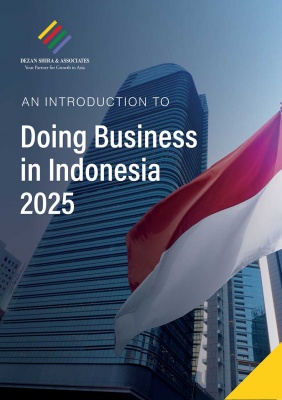
An Introduction to Doing Business in Indonesia 2025
Published: May 2025This publication, designed to introduce the fundamentals of investing in Indonesia, was compiled by the experts at Dezan Shira & Associates, a specialist foreign direct investment practice, that provides corporate establishment, business intelligence, tax advisory and compliance, accounting, payroll, due diligence, and financial review services to multinationals investing in emerging Asia.
Indonesia stands at the forefront of economic opportunity in Southeast Asia. With a population nearing 300 million, a growing middle class, and ongoing industrial transformation, the country offers an expansive market and a strategic gateway into the wider ASEAN region.
Foreign direct investment momentum has remained strong. In 2024, Indonesia attracted approximately US$55.3 billion in FDI, marking a 21 percent increase from the previous year. This surge was driven by significant inflows into the mining, metal refining, and manufacturing sectors, underscoring the country’s growing role in regional and global supply chains. Major contributors included Singapore, China, and Hong Kong, reflecting international confidence in Indonesia’s economic prospects.
Among Indonesia’s industrial priorities, the downstream mineral processing sector has emerged as a critical growth engine. By leveraging its abundant nickel reserves — accounting for approximately 42 percent of global supply — Indonesia has transitioned from exporting raw ore to producing refined, value-added products. This transformation has elevated the country’s role in global industries such as electric vehicle (EV) battery manufacturing. Reflecting the success of these efforts, Indonesia’s nickel export value surged from US$1.4 billion in 2020 to US$34.8 billion in 2023, positioning it as a central player in the evolving clean energy economy.
Supporting this industrial push is Indonesia’s significant demographic advantage. As of 2024, the country boasts a labor force of over 143 million people, making it the largest in Southeast Asia. With a median age of approximately 30 years, Indonesia is poised to benefit from a demographic bonus in the coming decades, offering investors access to a young, dynamic, and increasingly skilled workforce that can drive long-term economic growth.
However, the external trade environment is becoming more complex. In 2025, the United States imposed sweeping tariffs, including a 32 percent tariff on Indonesian exports — one of the highest among ASEAN nations. In response, Indonesia has engaged in active diplomacy, proposing expanded imports of U.S. goods and implementing regulatory reforms aimed at addressing trade imbalances.
Despite these external challenges, Indonesia’s macroeconomic fundamentals remain robust. The country’s GDP growth for 2025 is projected at around 5.1–5.2 percent, supported by disciplined fiscal management, resilient domestic demand, and diversification into higher-value industries.
For foreign investors, Indonesia offers a combination of strategic location, competitive labor costs, abundant resources, and a steadily expanding consumer market. Navigating Indonesia’s dynamic environment requires a long-term perspective and a practical understanding of regulatory frameworks, investment structures, and evolving market conditions.
An Introduction to Doing Business in Indonesia 2025, compiled by Dezan Shira & Associates, provides foreign enterprises and investors with a comprehensive overview of Indonesia’s business landscape. Covering corporate establishment, taxation, regulatory compliance, labor, and market entry strategies, this publication equips businesses with the essential insights needed to succeed in one of Asia’s most promising economies.
An Introduction to Doing Business in Indonesia 2025 covers the following:
- Indonesia’s New Positive Investment List
- Corporate establishment
- Taxation
- Human resources and payroll
- Audit and compliance.

